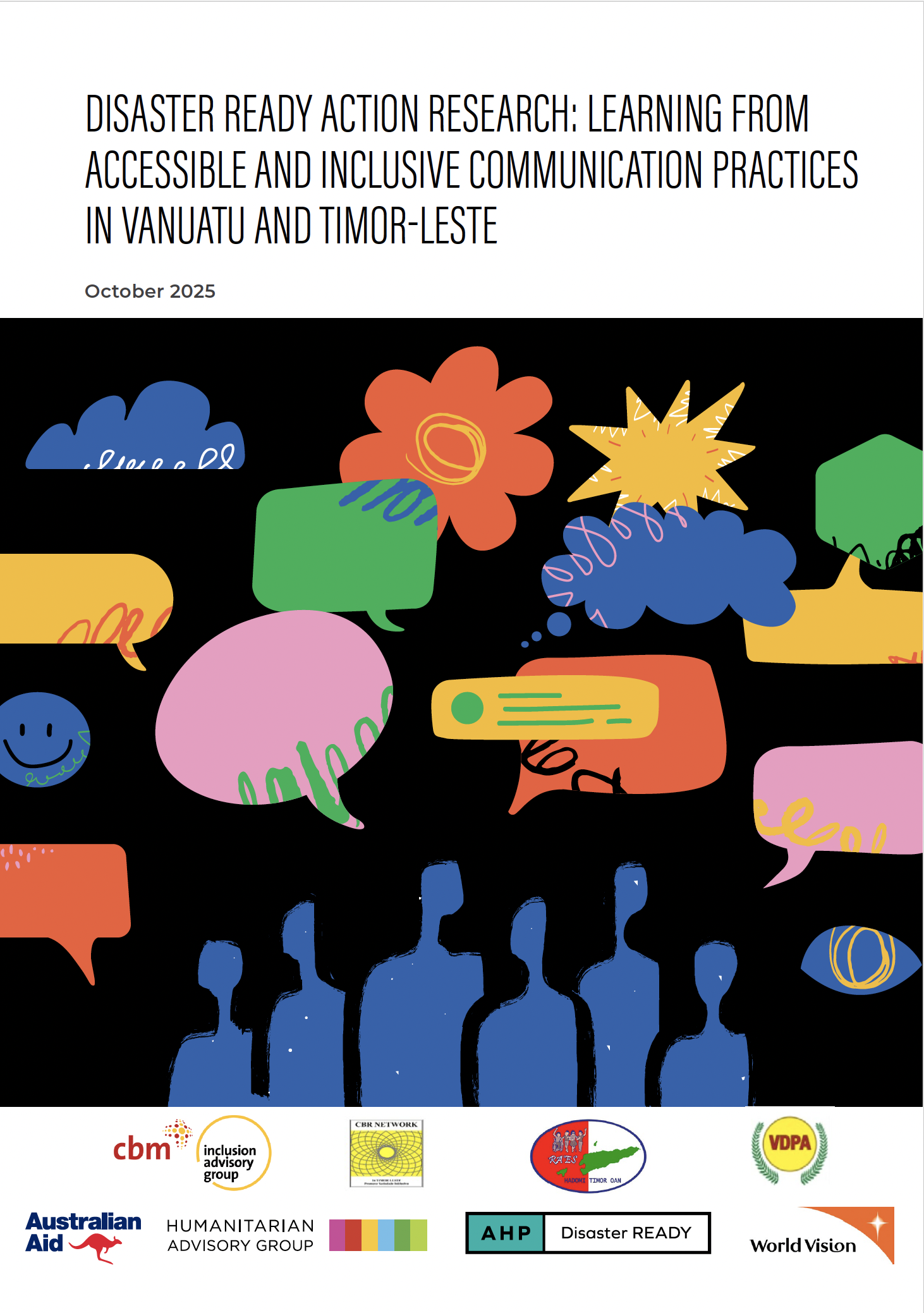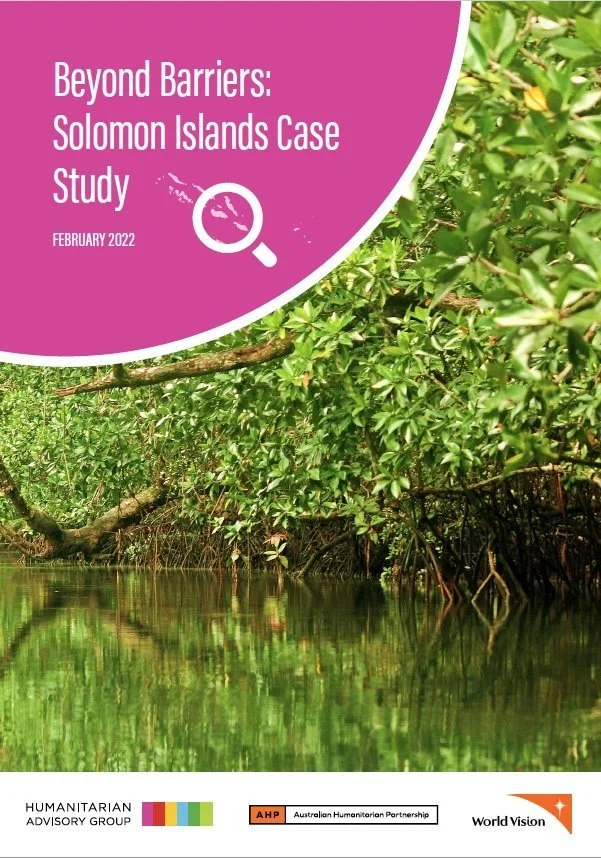Disaster READY action research: Learning from accessible and inclusive communication practices in Vanuatu and Timor-Leste
This study is to support DRCC members and partners to strengthen their practices of communication to communities for greater inclusion of persons with disabilities in disaster preparedness and climate resilience efforts. It builds on global best practice and contextual realities to identify opportunities for scaling up effective communication in context.
Organisations of Persons with Disabilities: Making a Difference in Vanuatu and Solomon Islands
The report draws on two comparative case studies in Vanuatu and Solomon Islands, as well as an extensive desk review of documents. It explores the roles and impact of Organisations of Persons with Disabilities (OPDs) in each country and identifies key challenges and enablers constraining and supporting OPDs’ contributions to the disaster preparedness and response sector, through a localisation lens.
Beyond barriers: Fiji case study
This case study explores Fiji’s progress in integration of climate change adaptation and DRR, identifying key themes and opportunities for stakeholders to advance approaches that reduce risk and enhance resilience at the community level in Fiji.
Beyond barriers: Papua New Guinea case study
In PNG disaster risk reduction and climate change adaptation activities largely operate largely in silos. This case study identifies opportunities for high-quality integrated approaches at the local and provincial levels to be replicated and scaled.
Beyond barriers: Solomon Islands case study
This case study explores Solomon Islands’ progress in the integration of DRR and climate change adaptation (CCA), identifying key themes and opportunities for stakeholders to advance approaches that reduce risk and enhance resilience in communities.
Beyond barriers: Vanuatu case study
This case study on the integration of disaster risk reduction and climate change adaptation policies in Vanuatu is part of the ‘Beyond Barriers’ series, an initiative of Humanitarian Advisory Group, Australian Humanitarian Partnership and World Vision Australia.
Beyond barriers: Timor-Leste case study
This case study is part of the Humanitarian Advisory Group and World Vision Beyond Barriers research project on climate change adaptation and disaster risk reduction integration, focusing on Australian Humanitarian Partnership programming in Timor-Leste.
Beyond barriers: reflection and learning forum workshop report
This report presents outcomes from a Learning Forum in November 2021 to further explore opportunities to advance the integration of disaster risk reduction and climate change adaptation in the Pacific.
Beyond barriers: integrating disaster risk reduction and climate change adaptation in the Pacific
A research report produced jointly by Humanitarian Advisory Group, Australian Humanitarian Partnership and World Vision Australia.
Disability Inclusion in Disaster Preparedness and Response: an evaluation of disability inclusion in the Disaster READY program in Fiji, Vanuatu, Solomon Islands, Papua New Guinea and Timor-Leste
An independent evaluation of disability inclusion in disaster preparedness and response in the Disaster READY program, June 2021.
Thematic Guidance Note: Using Evidence to Inform and Monitor Disability-Inclusive Disaster Risk Reduction
Disaster READY: Disability inclusion evaluation.
Thematic Guidance Note: Influencing Government-led Disability Inclusive Disaster Risk Reduction
Disaster READY: Disability inclusion evaluation.
Thematic Guidance Note: Strengthening Disability Inclusion in Community-based Disaster Preparedness
Disaster READY: Disability inclusion evaluation.
Disaster READY PNG: Qualitative Project Review
Disaster READY: This review was commissioned by CARE International in Papua New Guinea to support Disaster READY PNG evidence collection and planning.
Disaster READY: Fiji Shelter Handbook: Inclusive and Accessible Shelter Planning for Fijian Communities
The Fiji Shelter Handbook is the first of three national shelter guidelines for Fiji, Vanuatu and the Solomon Islands that are being published under Disaster READY. The aim is to increase knowledge of disaster resilient construction techniques and methodologies, and safer shelter practice, as well as the capacity of responding stakeholders to deliver better coordinated, more efficient and safer disaster response and recovery construction in Fiji, Vanuatu and the Solomon Islands.
Disaster READY: Traditional knowledge as an early warning system in the Solomon Islands.
World Vision Australia and the Australian Bureau of Meteorology supported the Solomon Islands Meteorological Services to complete surveys of the role of traditional knowledge in warning communities of potential disasters in the Solomon Islands. The survey and this report are part of a larger Traditional Knowledge Project being implemented by the Solomon Islands Meteorological Services.
Disaster READY: Investing in the Sustainability of Community Disaster and Climate Change Committees in Vanuatu
The Australian Government through the Australian Humanitarian Partnership Disaster READY program, World Vision Vanuatu and CARE developed a joint survey to take a deeper look at Community Disaster and Climate Change Committees in Vanuatu.. This review presents key findings from the survey, and seeks to highlight learnings that might build a better understanding of the role of these committee in disaster preparedness, response and recovery and how the Disaster READY program can best provide support.
Sendai Framework for Disaster Risk Reduction 2015-2030
Aims to guide the multi-hazard management of disaster risk in development at all levels as well as within and across all sectors.




















